In Part 1 of this series, we looked at what factors could influence the death of Magic. If you haven’t read that installment yet, you can find it here. In this case, the “death” of the game is defined as a point where Wizards of the Coast stops producing new cards, both in paper or digital. Today, we’ll theorize over what things would look like after the death of the game. The faucet might turn off someday, but what happens afterwards would be uncharted territory for everyone.
Key Events
The death of Magic, if it happens, likely won’t be a surprise. It will be the result of months, if not years of decline. Given the size of the player base now, a death of Magic would resemble the dying of a star. It would experience a variety of transformations, expending its energy before disappearing into the inky void of space.
These events could include an implosion of the secondary market, a surge in competing games, even a late-stage reversal of the Reserved List. There’s no precedent of this size in the card game world, so anything could happen.
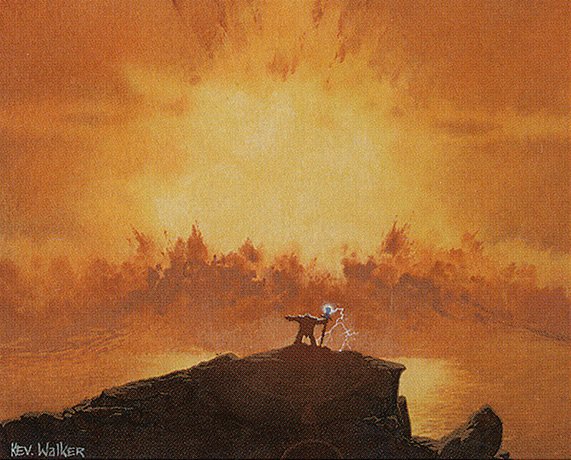
Obliterate by Kev Walker
The Secondary Market
The market for Magic cards is a puzzle for fans and retailers alike. But with the faucet of cards being turned off, the market for Magic would experience a massive change. While they wouldn’t become as useless as my economics degree, Magic cards would be subject to forces that pull their prices in various directions.

Supply
With the death of Magic, so goes the stream of reprints we rely on to build decks that should probably run more lands. Every remaining card on earth would be the pool we’re left with. In economic terms, this would make Magic cards a perfectly inelastic good. The supply curve would turn into a vertical line, meaning that prices would be solely determined by demand.
As scary as it is to think that Talrand, Sky Summoner would never see another reprint, there are still a lot of Magic cards out there. As someone who reveres his one dual land, a beat-up Plateau, it’s difficult to conceptualize how many are stuffed in shoeboxes around the world. Not to mention how much Magic product sits factory-sealed, on palettes or shelves that don’t see the light of day. That’s a lot of Plateaus, and even more Talrands.

Talrand, Sky Summoner by Svetlin Velinov
The liquidity of that supply would be another factor to consider. Would it stay locked away, or would it get out into the market for players? This question would affect retailers both large and small. Large retailers like Walmart or Target would be incentivized to move their product in massive quantities, in order to avoid taxes associated with unsold inventory at year end. This would create seismic shifts in the amount of current, sealed Magic product on the market. For smaller retailers, those changes could be crippling for turning a profit on their original investment.
As years pass from the end date, the card supply would slowly dwindle as cards are lost to damage, or from being stuffed away and forgotten in shoe boxes around the world. For the Magic fans who stick around, this could result in some challenges in finding things that they want.
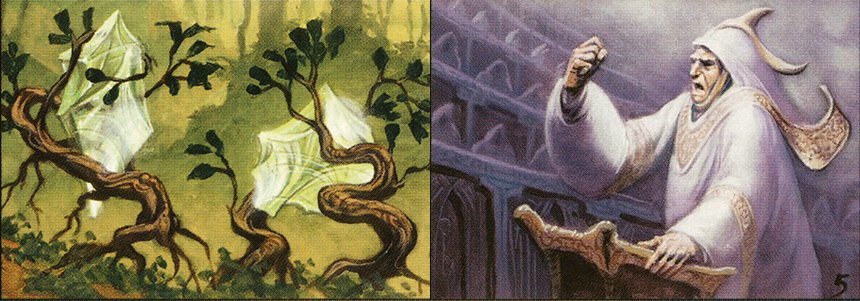
Supply // Demand by Daren Bader
Demand
It’s fairly straightforward to think about the global supply of Magic cards, but demand would be a different story. There are a few different scenarios that could play out, all of which would shift the demand curve.
Assuming that the conclusion of Magic would come in the form of an online announcement, there could be an initial rush on cards. If players knew that Scalding Tarn or Mana Crypt weren’t coming back, then it would be time to get their copies before they disappear to another buyer. Imagine a Costco in 2020, but with people who were told that toilet paper was never coming back.
Other panic-buying could come from speculators, who are banking on the Magic IP being picked up by another company. They’d be looking to “buy the dip,” so that they could come out ahead if Magic were to come back.
Demand could experience a drop that would outweigh these rushes. If large swathes of players lose interest in Magic altogether, then that drops the demand on cards as a whole. Consistent releases of new cards is what keeps a lot of people coming back to the game. With a fixed card supply, this affects how much sealed product gets opened. Booster drafts and set booster openings cause a lot of cards to get out into the wild, but as those shrink, so does the liquidity in the now-fixed card pool.
The death of Magic would drastically change the landscape of the community. Demand would be pulled in a variety of directions, all of which are too difficult to accurately predict right now. It does, however, create something new from the ashes.
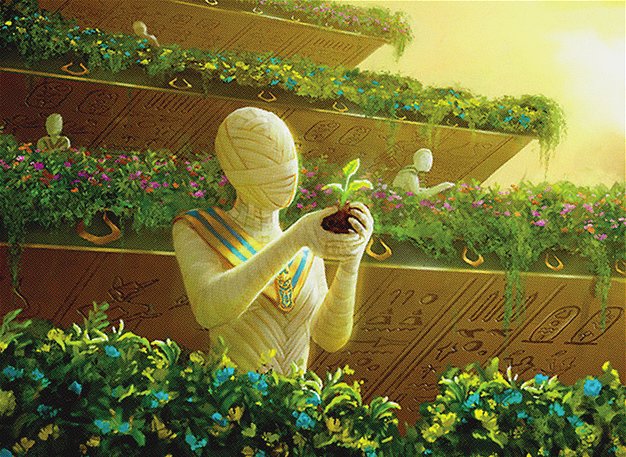
Harvest Season by Shreya Shetty
The Golden Age of Proxies
If there was no need to sanction a Magic tournament anymore, then proxying would explode in popularity. Legacy could grow as a format, you could play Vintage in a McDonald’s, and fish would start returning to Venetian waters. The last one probably wouldn’t happen, but you get the idea.
Proxy legality would come down to individual playgroups, or tournament organizers who run community-driven events. But if you’re a tournament organizer, would you want to sit down and deck check 30 players in one go? If someone was clearly using a dual land with MTGO art at Commander night, would they feel the need to say that they’re using proxies? The conversation on proxies changes if there are no official rules against them. As cards become harder to acquire, players could turn to proxies as a way of keeping their hobby alive. It’s possible that we could see a late-stage reversal of the Reserved List, as a dying gasp to save the game. But even if that happened, would it even matter in an era of proxies?
Custom Magic sets could also see a rise in this time period. With players starved for new and exciting sets to play, the mantle could be picked up by amateur designers in the community. This could give rise to traditional draft sets, custom-built Commander decks, and other games that use Magic mechanics.
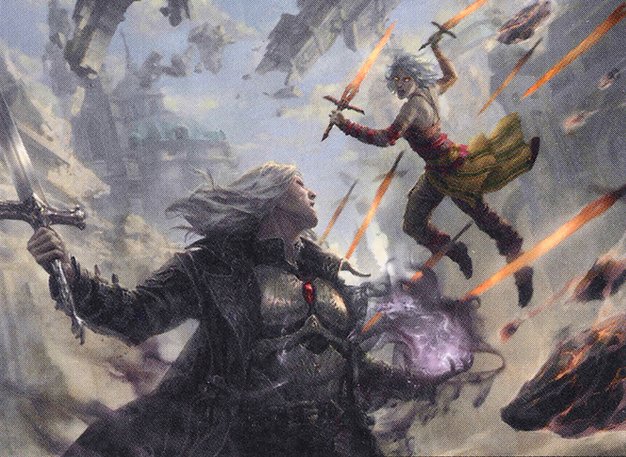
Single Combat by Livia Prima
Tournaments, Events, or Lack Thereof?
With the death of Magic, we have the challenge of not having a governing body at the top. As it stands now, Wizards of the Coast administers bans, enacts rules changes, and hands out punishments for cheating. But with Magic out of the hands of Wizards, those actions come down to communities of players. There has been success with community-driven ban lists, such as Commander or Pauper, so there’s hope for a self-sustaining system. In order to ensure success of competitive formats, there would need to be some form of a baton pass to a community group. Without an official blessing from Wizards, there could be infighting between factions of players. Does anyone want to relive the days of Pauper being defined by two different ban lists? Neither do I.
A lack of the Wizards rubber stamp could spell trouble when it comes to fielding judges for events. Tournament organizing is already a tough business to be in, so an added complication like this wouldn’t be helpful. This would be another nail in the coffin for large events, like Command Fests, which require huge investments from organizers. However, smaller events could survive. With less staff needed, there’s hope that they could keep going. Gone would be the days of convention centers, and instead they’d be replaced with community centers, public libraries, and VFW halls.
You could theorize that with large-scale embracing of proxies, then there could be a potential growth in certain tournament scenes. However, the longer a format goes without new cards, the closer it gets to being solved. Proxies might be a huge help for keeping tournaments alive in the short run, but the lack of fresh new cards could still prove fatal for a scene.
As the years go by, Magic would likely retreat to enthusiast circles online. MTGO and Magic Arena would be long gone, but webcam tournaments could still be run. As long as you have a webcam and some cards, the past few years have shown that you can play anyone around the world.
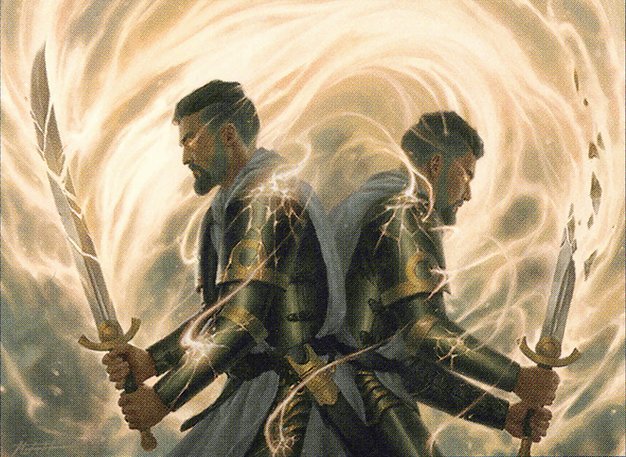
Brought Back by Mitchell Malloy
Potential Resurrection
With an IP as popular as Magic, there’s always a chance that another company could pick it up. If the game is pronounced “dead” at some point, then that could mean that the total value of the property is much less than where it is now. Some opportunistic company could try their hand at picking up where Wizards or Hasbro left off. It would need some drastic changes, though, in order to salvage the decline that led to that point.
Who knows what Magic would look like if acquired by Mattel, Activision-Blizzard, Nintendo, or even Amazon? We can’t rule out the possibility of a resurrection in this capacity. If there is enough of a foundation to build upon, then Magic’s death could only be temporary.
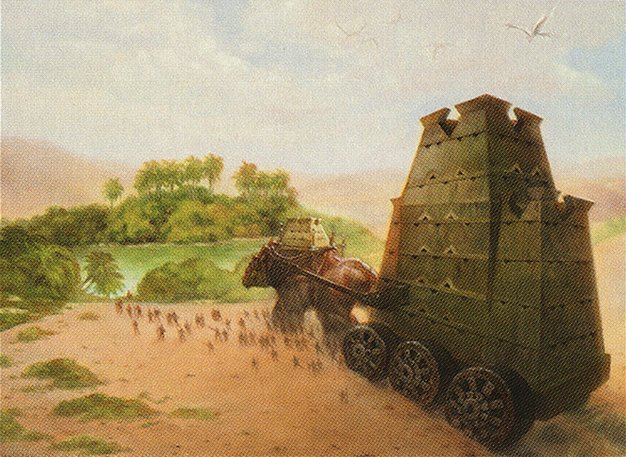
Map the Wastes by Volkan Baga
If Magic Does Die, Then What Do the Rest of Us Do?
I’ve often wondered what would happen if Magic were to cease. It’s difficult for me to picture new Magic cards in 2050, but that’s the beauty of it. It was difficult for people to picture Magic being played in 2022, when the sky was falling from Chronicles being printed. Magic continually breaks new ground, so it could last that long or further.
As much as it scares me to think about my favorite game dying, I know that there will always be people to play cards with. Consider Premodern as an example of a “post-apocalyptic” Magic community. The card pool is fixed from 1995-2003, as if Wizards stopped producing the game when the modern border came out. Most cards in a Premodern deck are old enough to drink, but people don’t complain about the lack of new tools. They’re playing Premodern because it’s still fun to resolve Phyrexian Dreadnought on Turn 2, even after two decades of the same play. As long as people enjoy the format, they’ll keep going.
Sometimes I think about being in my 80s, doing cube drafts in a retirement home. Who knows if Wizards will still be producing cards then, but I’ll keep my Triple Innistrad Cube for life. As long as I can get new card sleeves, then I’ll get to hear people ask why a certain card is still in the pack. The game will still start at 20 life, you’ll still tap lands for mana, and the Spider Spawning deck won’t be open. As long as you enjoy the cards you’re playing, then why would you ever stop?
Travis Norman (he/him) is a writer and photographer from the wooded foothills of New York, currently living in South Carolina. He plays nearly every Magic format, but has a special love for Legacy, Premodern, and Canadian Highlander. He has loved Magic since Starter 1999, but he champions having a healthy mental and financial relationship with the game. When not playing games, he enjoys cycling, tea, and dog parks. You can follow his exploits here on Twitter and Instagram.

